Analyzing Attachment Theories, Deprivation, and Daycare Effects
VerifiedAdded on 2023/06/14
|10
|2955
|133
Essay
AI Summary
This essay provides a comprehensive analysis of attachment theories, differentiating between evolutionary and cupboard love theories, and explores the concepts of deprivation and privation in child development. It further examines the positive and negative impacts of daycare on children's social and cognitive development, highlighting aspects such as social interaction, communication skills, aggression, and the mother-child relationship. The essay emphasizes the importance of quality daycare and its potential effects on a child's academic performance, confidence, and overall well-being, while also cautioning against the risks associated with low-quality care and reduced parental attachment. Desklib offers a range of similar solved assignments for students.
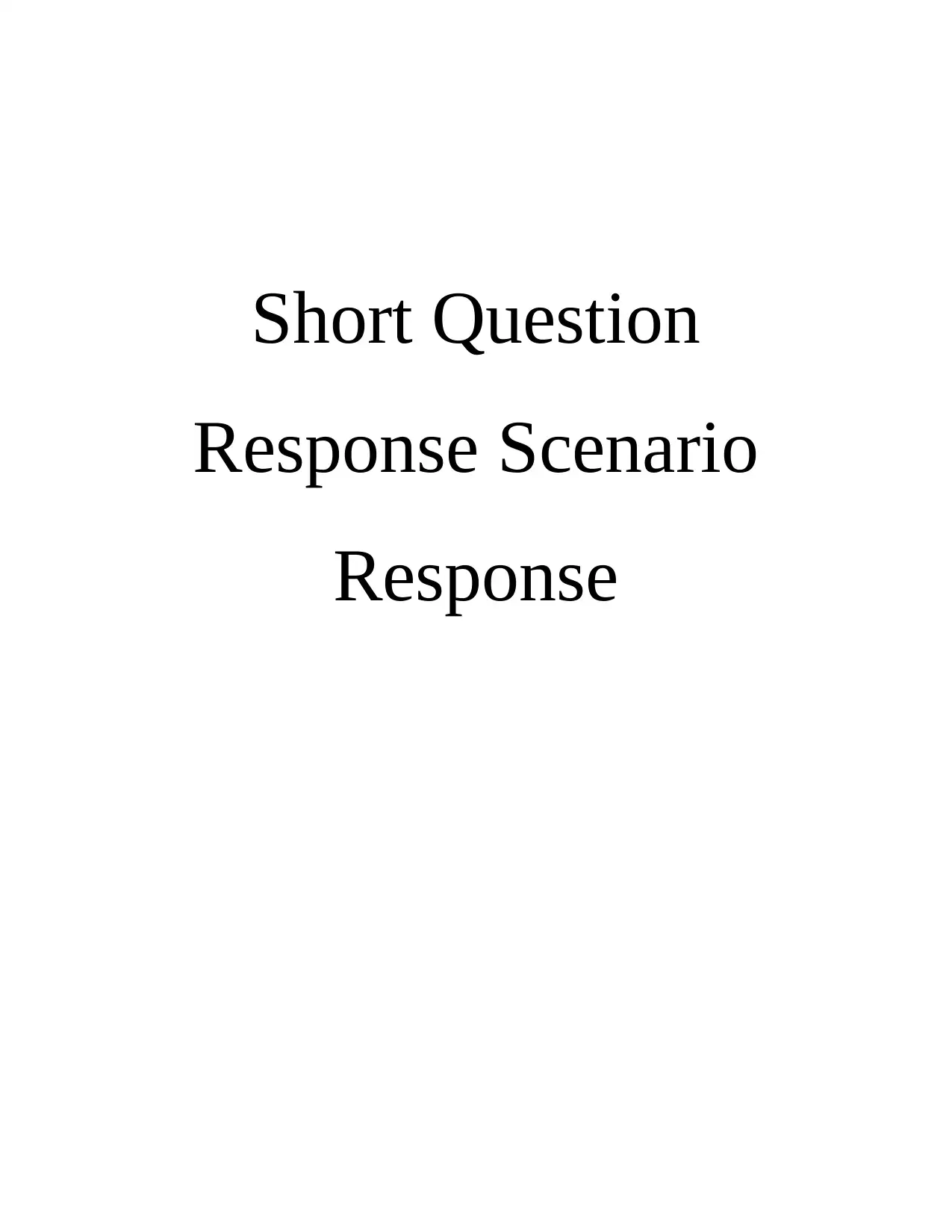
Short Question
Response Scenario
Response
Response Scenario
Response
Paraphrase This Document
Need a fresh take? Get an instant paraphrase of this document with our AI Paraphraser
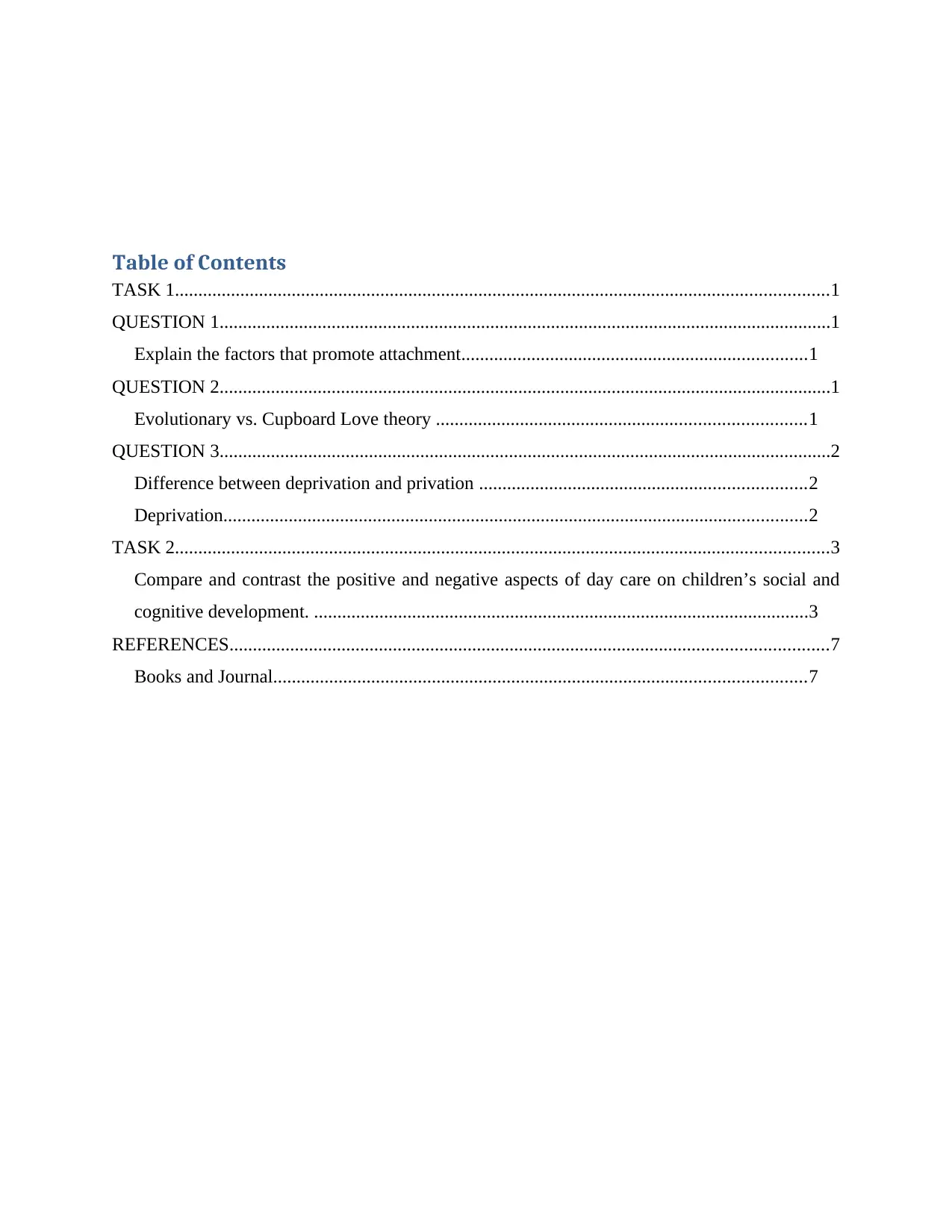
Table of Contents
TASK 1............................................................................................................................................1
QUESTION 1...................................................................................................................................1
Explain the factors that promote attachment..........................................................................1
QUESTION 2...................................................................................................................................1
Evolutionary vs. Cupboard Love theory ...............................................................................1
QUESTION 3...................................................................................................................................2
Difference between deprivation and privation ......................................................................2
Deprivation.............................................................................................................................2
TASK 2............................................................................................................................................3
Compare and contrast the positive and negative aspects of day care on children’s social and
cognitive development. ..........................................................................................................3
REFERENCES................................................................................................................................7
Books and Journal..................................................................................................................7
TASK 1............................................................................................................................................1
QUESTION 1...................................................................................................................................1
Explain the factors that promote attachment..........................................................................1
QUESTION 2...................................................................................................................................1
Evolutionary vs. Cupboard Love theory ...............................................................................1
QUESTION 3...................................................................................................................................2
Difference between deprivation and privation ......................................................................2
Deprivation.............................................................................................................................2
TASK 2............................................................................................................................................3
Compare and contrast the positive and negative aspects of day care on children’s social and
cognitive development. ..........................................................................................................3
REFERENCES................................................................................................................................7
Books and Journal..................................................................................................................7
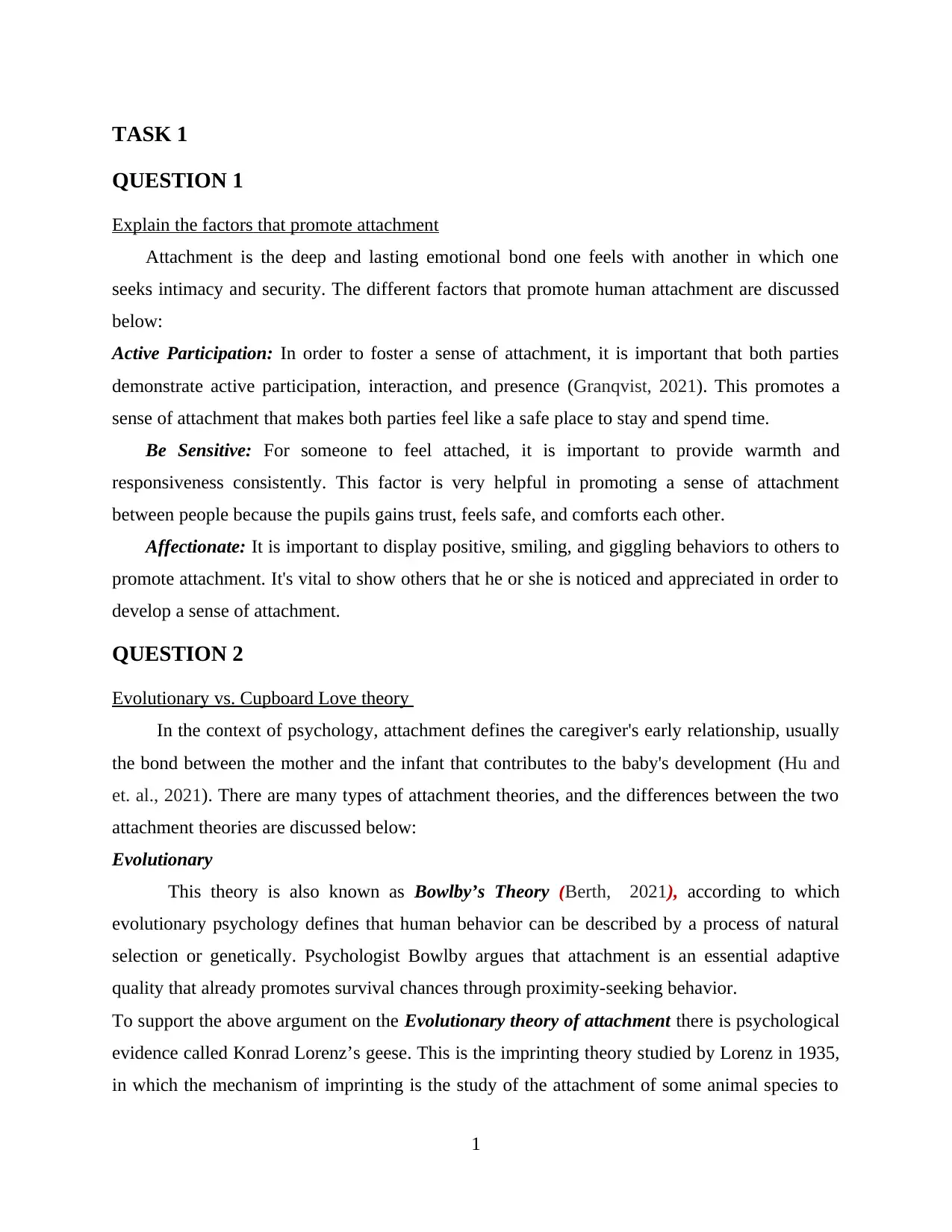
TASK 1
QUESTION 1
Explain the factors that promote attachment
Attachment is the deep and lasting emotional bond one feels with another in which one
seeks intimacy and security. The different factors that promote human attachment are discussed
below:
Active Participation: In order to foster a sense of attachment, it is important that both parties
demonstrate active participation, interaction, and presence (Granqvist, 2021). This promotes a
sense of attachment that makes both parties feel like a safe place to stay and spend time.
Be Sensitive: For someone to feel attached, it is important to provide warmth and
responsiveness consistently. This factor is very helpful in promoting a sense of attachment
between people because the pupils gains trust, feels safe, and comforts each other.
Affectionate: It is important to display positive, smiling, and giggling behaviors to others to
promote attachment. It's vital to show others that he or she is noticed and appreciated in order to
develop a sense of attachment.
QUESTION 2
Evolutionary vs. Cupboard Love theory
In the context of psychology, attachment defines the caregiver's early relationship, usually
the bond between the mother and the infant that contributes to the baby's development (Hu and
et. al., 2021). There are many types of attachment theories, and the differences between the two
attachment theories are discussed below:
Evolutionary
This theory is also known as Bowlby’s Theory (Berth, 2021), according to which
evolutionary psychology defines that human behavior can be described by a process of natural
selection or genetically. Psychologist Bowlby argues that attachment is an essential adaptive
quality that already promotes survival chances through proximity-seeking behavior.
To support the above argument on the Evolutionary theory of attachment there is psychological
evidence called Konrad Lorenz’s geese. This is the imprinting theory studied by Lorenz in 1935,
in which the mechanism of imprinting is the study of the attachment of some animal species to
1
QUESTION 1
Explain the factors that promote attachment
Attachment is the deep and lasting emotional bond one feels with another in which one
seeks intimacy and security. The different factors that promote human attachment are discussed
below:
Active Participation: In order to foster a sense of attachment, it is important that both parties
demonstrate active participation, interaction, and presence (Granqvist, 2021). This promotes a
sense of attachment that makes both parties feel like a safe place to stay and spend time.
Be Sensitive: For someone to feel attached, it is important to provide warmth and
responsiveness consistently. This factor is very helpful in promoting a sense of attachment
between people because the pupils gains trust, feels safe, and comforts each other.
Affectionate: It is important to display positive, smiling, and giggling behaviors to others to
promote attachment. It's vital to show others that he or she is noticed and appreciated in order to
develop a sense of attachment.
QUESTION 2
Evolutionary vs. Cupboard Love theory
In the context of psychology, attachment defines the caregiver's early relationship, usually
the bond between the mother and the infant that contributes to the baby's development (Hu and
et. al., 2021). There are many types of attachment theories, and the differences between the two
attachment theories are discussed below:
Evolutionary
This theory is also known as Bowlby’s Theory (Berth, 2021), according to which
evolutionary psychology defines that human behavior can be described by a process of natural
selection or genetically. Psychologist Bowlby argues that attachment is an essential adaptive
quality that already promotes survival chances through proximity-seeking behavior.
To support the above argument on the Evolutionary theory of attachment there is psychological
evidence called Konrad Lorenz’s geese. This is the imprinting theory studied by Lorenz in 1935,
in which the mechanism of imprinting is the study of the attachment of some animal species to
1
⊘ This is a preview!⊘
Do you want full access?
Subscribe today to unlock all pages.

Trusted by 1+ million students worldwide
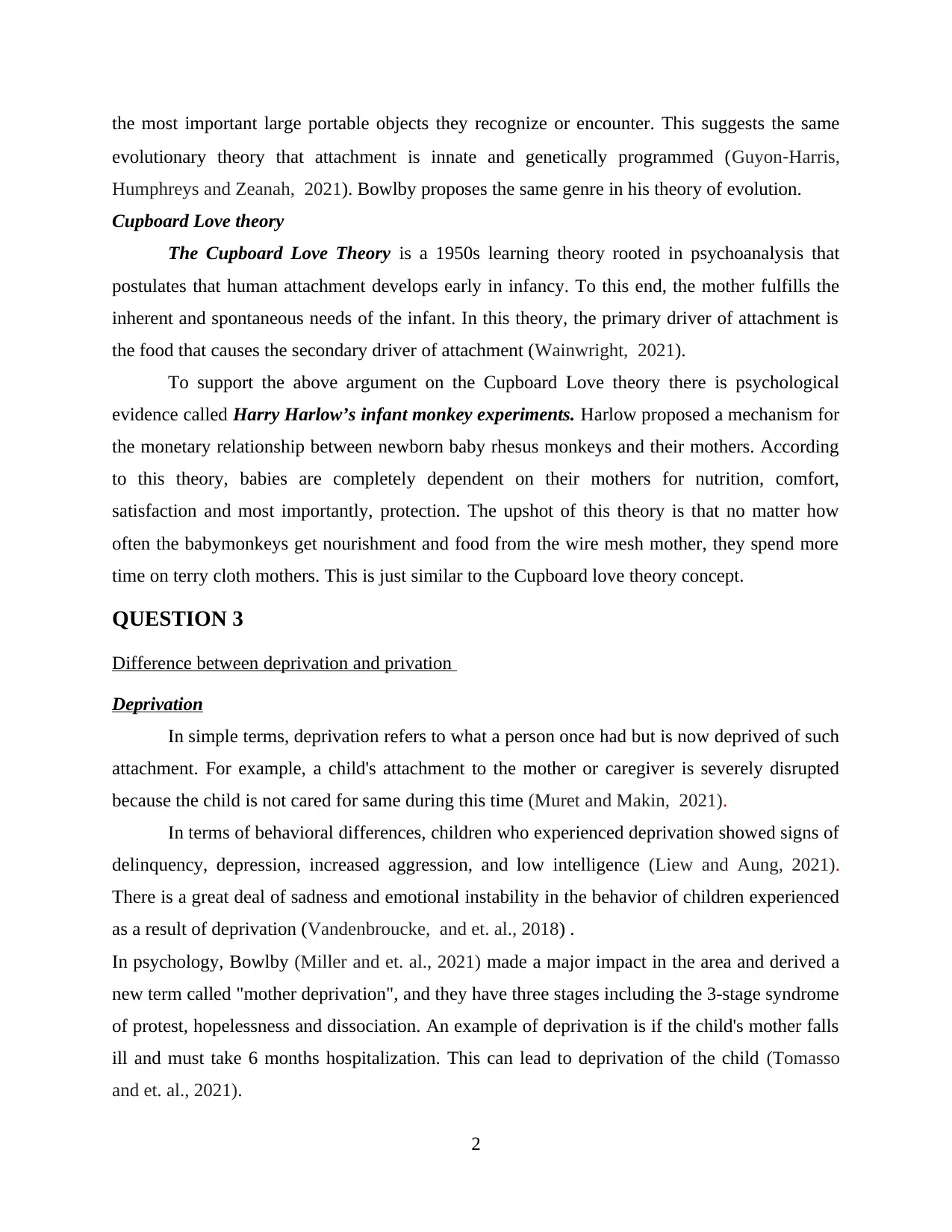
the most important large portable objects they recognize or encounter. This suggests the same
evolutionary theory that attachment is innate and genetically programmed (Guyon‐Harris,
Humphreys and Zeanah, 2021). Bowlby proposes the same genre in his theory of evolution.
Cupboard Love theory
The Cupboard Love Theory is a 1950s learning theory rooted in psychoanalysis that
postulates that human attachment develops early in infancy. To this end, the mother fulfills the
inherent and spontaneous needs of the infant. In this theory, the primary driver of attachment is
the food that causes the secondary driver of attachment (Wainwright, 2021).
To support the above argument on the Cupboard Love theory there is psychological
evidence called Harry Harlow’s infant monkey experiments. Harlow proposed a mechanism for
the monetary relationship between newborn baby rhesus monkeys and their mothers. According
to this theory, babies are completely dependent on their mothers for nutrition, comfort,
satisfaction and most importantly, protection. The upshot of this theory is that no matter how
often the babymonkeys get nourishment and food from the wire mesh mother, they spend more
time on terry cloth mothers. This is just similar to the Cupboard love theory concept.
QUESTION 3
Difference between deprivation and privation
Deprivation
In simple terms, deprivation refers to what a person once had but is now deprived of such
attachment. For example, a child's attachment to the mother or caregiver is severely disrupted
because the child is not cared for same during this time (Muret and Makin, 2021).
In terms of behavioral differences, children who experienced deprivation showed signs of
delinquency, depression, increased aggression, and low intelligence (Liew and Aung, 2021).
There is a great deal of sadness and emotional instability in the behavior of children experienced
as a result of deprivation (Vandenbroucke, and et. al., 2018) .
In psychology, Bowlby (Miller and et. al., 2021) made a major impact in the area and derived a
new term called "mother deprivation", and they have three stages including the 3-stage syndrome
of protest, hopelessness and dissociation. An example of deprivation is if the child's mother falls
ill and must take 6 months hospitalization. This can lead to deprivation of the child (Tomasso
and et. al., 2021).
2
evolutionary theory that attachment is innate and genetically programmed (Guyon‐Harris,
Humphreys and Zeanah, 2021). Bowlby proposes the same genre in his theory of evolution.
Cupboard Love theory
The Cupboard Love Theory is a 1950s learning theory rooted in psychoanalysis that
postulates that human attachment develops early in infancy. To this end, the mother fulfills the
inherent and spontaneous needs of the infant. In this theory, the primary driver of attachment is
the food that causes the secondary driver of attachment (Wainwright, 2021).
To support the above argument on the Cupboard Love theory there is psychological
evidence called Harry Harlow’s infant monkey experiments. Harlow proposed a mechanism for
the monetary relationship between newborn baby rhesus monkeys and their mothers. According
to this theory, babies are completely dependent on their mothers for nutrition, comfort,
satisfaction and most importantly, protection. The upshot of this theory is that no matter how
often the babymonkeys get nourishment and food from the wire mesh mother, they spend more
time on terry cloth mothers. This is just similar to the Cupboard love theory concept.
QUESTION 3
Difference between deprivation and privation
Deprivation
In simple terms, deprivation refers to what a person once had but is now deprived of such
attachment. For example, a child's attachment to the mother or caregiver is severely disrupted
because the child is not cared for same during this time (Muret and Makin, 2021).
In terms of behavioral differences, children who experienced deprivation showed signs of
delinquency, depression, increased aggression, and low intelligence (Liew and Aung, 2021).
There is a great deal of sadness and emotional instability in the behavior of children experienced
as a result of deprivation (Vandenbroucke, and et. al., 2018) .
In psychology, Bowlby (Miller and et. al., 2021) made a major impact in the area and derived a
new term called "mother deprivation", and they have three stages including the 3-stage syndrome
of protest, hopelessness and dissociation. An example of deprivation is if the child's mother falls
ill and must take 6 months hospitalization. This can lead to deprivation of the child (Tomasso
and et. al., 2021).
2
Paraphrase This Document
Need a fresh take? Get an instant paraphrase of this document with our AI Paraphraser
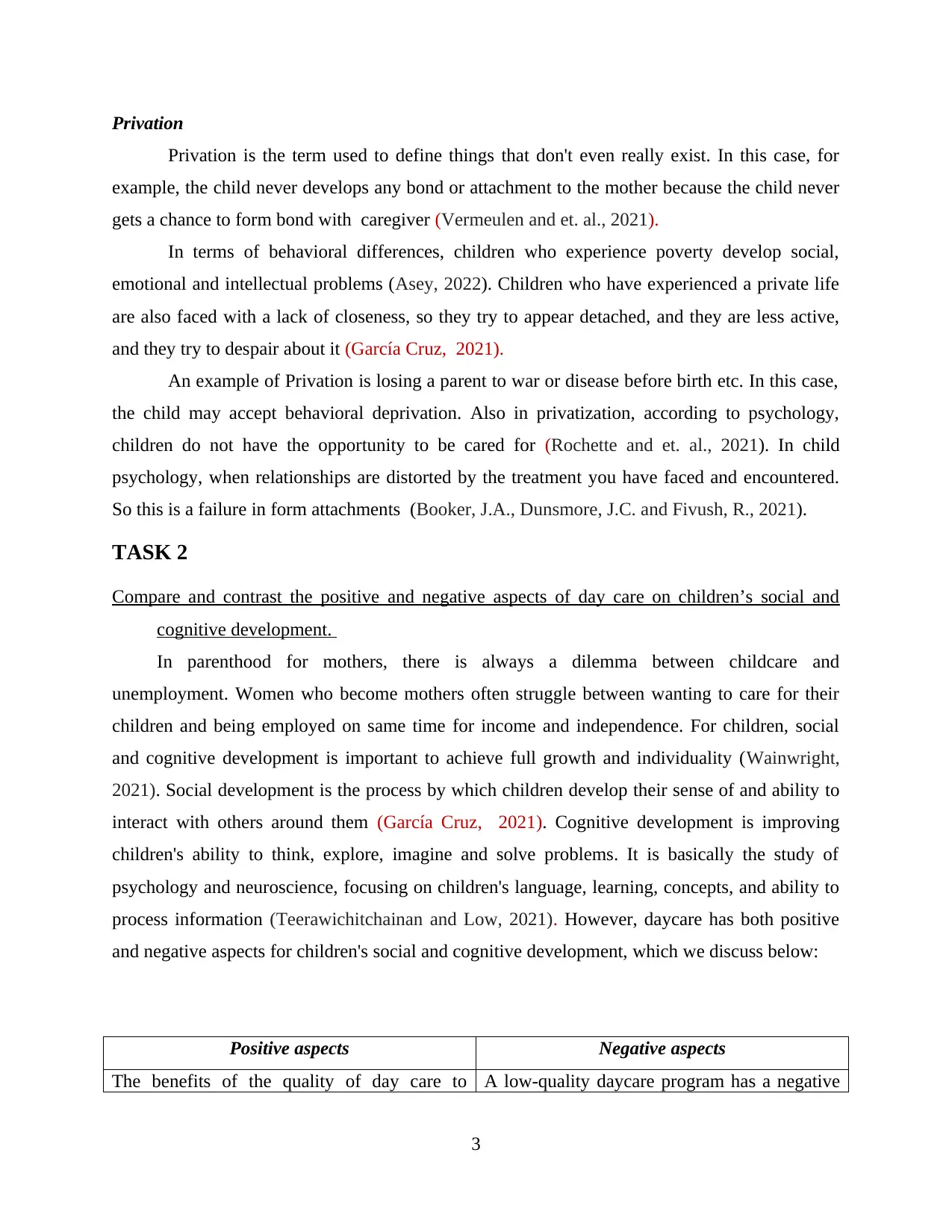
Privation
Privation is the term used to define things that don't even really exist. In this case, for
example, the child never develops any bond or attachment to the mother because the child never
gets a chance to form bond with caregiver (Vermeulen and et. al., 2021).
In terms of behavioral differences, children who experience poverty develop social,
emotional and intellectual problems (Asey, 2022). Children who have experienced a private life
are also faced with a lack of closeness, so they try to appear detached, and they are less active,
and they try to despair about it (García Cruz, 2021).
An example of Privation is losing a parent to war or disease before birth etc. In this case,
the child may accept behavioral deprivation. Also in privatization, according to psychology,
children do not have the opportunity to be cared for (Rochette and et. al., 2021). In child
psychology, when relationships are distorted by the treatment you have faced and encountered.
So this is a failure in form attachments (Booker, J.A., Dunsmore, J.C. and Fivush, R., 2021).
TASK 2
Compare and contrast the positive and negative aspects of day care on children’s social and
cognitive development.
In parenthood for mothers, there is always a dilemma between childcare and
unemployment. Women who become mothers often struggle between wanting to care for their
children and being employed on same time for income and independence. For children, social
and cognitive development is important to achieve full growth and individuality (Wainwright,
2021). Social development is the process by which children develop their sense of and ability to
interact with others around them (García Cruz, 2021). Cognitive development is improving
children's ability to think, explore, imagine and solve problems. It is basically the study of
psychology and neuroscience, focusing on children's language, learning, concepts, and ability to
process information (Teerawichitchainan and Low, 2021). However, daycare has both positive
and negative aspects for children's social and cognitive development, which we discuss below:
Positive aspects Negative aspects
The benefits of the quality of day care to A low-quality daycare program has a negative
3
Privation is the term used to define things that don't even really exist. In this case, for
example, the child never develops any bond or attachment to the mother because the child never
gets a chance to form bond with caregiver (Vermeulen and et. al., 2021).
In terms of behavioral differences, children who experience poverty develop social,
emotional and intellectual problems (Asey, 2022). Children who have experienced a private life
are also faced with a lack of closeness, so they try to appear detached, and they are less active,
and they try to despair about it (García Cruz, 2021).
An example of Privation is losing a parent to war or disease before birth etc. In this case,
the child may accept behavioral deprivation. Also in privatization, according to psychology,
children do not have the opportunity to be cared for (Rochette and et. al., 2021). In child
psychology, when relationships are distorted by the treatment you have faced and encountered.
So this is a failure in form attachments (Booker, J.A., Dunsmore, J.C. and Fivush, R., 2021).
TASK 2
Compare and contrast the positive and negative aspects of day care on children’s social and
cognitive development.
In parenthood for mothers, there is always a dilemma between childcare and
unemployment. Women who become mothers often struggle between wanting to care for their
children and being employed on same time for income and independence. For children, social
and cognitive development is important to achieve full growth and individuality (Wainwright,
2021). Social development is the process by which children develop their sense of and ability to
interact with others around them (García Cruz, 2021). Cognitive development is improving
children's ability to think, explore, imagine and solve problems. It is basically the study of
psychology and neuroscience, focusing on children's language, learning, concepts, and ability to
process information (Teerawichitchainan and Low, 2021). However, daycare has both positive
and negative aspects for children's social and cognitive development, which we discuss below:
Positive aspects Negative aspects
The benefits of the quality of day care to A low-quality daycare program has a negative
3
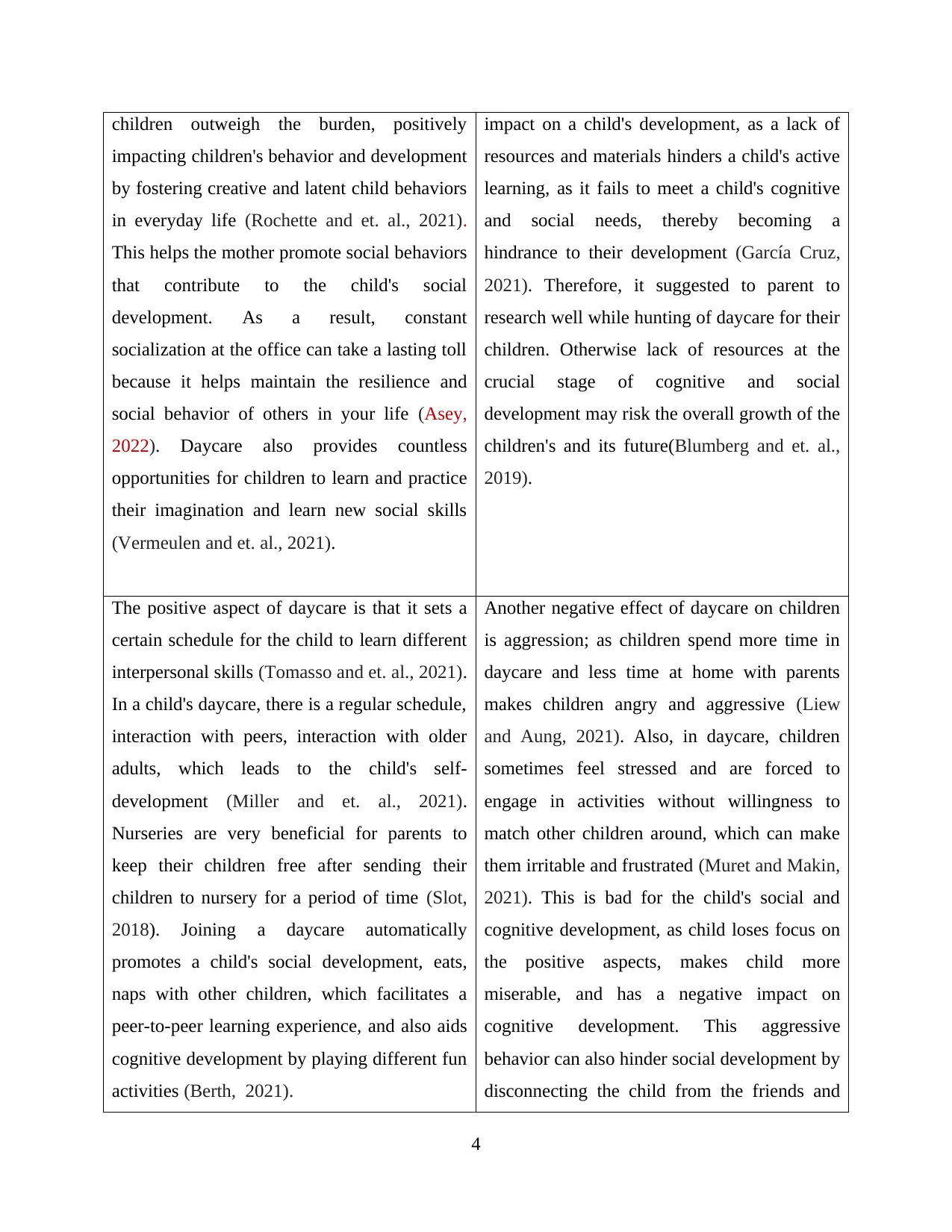
children outweigh the burden, positively
impacting children's behavior and development
by fostering creative and latent child behaviors
in everyday life (Rochette and et. al., 2021).
This helps the mother promote social behaviors
that contribute to the child's social
development. As a result, constant
socialization at the office can take a lasting toll
because it helps maintain the resilience and
social behavior of others in your life (Asey,
2022). Daycare also provides countless
opportunities for children to learn and practice
their imagination and learn new social skills
(Vermeulen and et. al., 2021).
impact on a child's development, as a lack of
resources and materials hinders a child's active
learning, as it fails to meet a child's cognitive
and social needs, thereby becoming a
hindrance to their development (García Cruz,
2021). Therefore, it suggested to parent to
research well while hunting of daycare for their
children. Otherwise lack of resources at the
crucial stage of cognitive and social
development may risk the overall growth of the
children's and its future(Blumberg and et. al.,
2019).
The positive aspect of daycare is that it sets a
certain schedule for the child to learn different
interpersonal skills (Tomasso and et. al., 2021).
In a child's daycare, there is a regular schedule,
interaction with peers, interaction with older
adults, which leads to the child's self-
development (Miller and et. al., 2021).
Nurseries are very beneficial for parents to
keep their children free after sending their
children to nursery for a period of time (Slot,
2018). Joining a daycare automatically
promotes a child's social development, eats,
naps with other children, which facilitates a
peer-to-peer learning experience, and also aids
cognitive development by playing different fun
activities (Berth, 2021).
Another negative effect of daycare on children
is aggression; as children spend more time in
daycare and less time at home with parents
makes children angry and aggressive (Liew
and Aung, 2021). Also, in daycare, children
sometimes feel stressed and are forced to
engage in activities without willingness to
match other children around, which can make
them irritable and frustrated (Muret and Makin,
2021). This is bad for the child's social and
cognitive development, as child loses focus on
the positive aspects, makes child more
miserable, and has a negative impact on
cognitive development. This aggressive
behavior can also hinder social development by
disconnecting the child from the friends and
4
impacting children's behavior and development
by fostering creative and latent child behaviors
in everyday life (Rochette and et. al., 2021).
This helps the mother promote social behaviors
that contribute to the child's social
development. As a result, constant
socialization at the office can take a lasting toll
because it helps maintain the resilience and
social behavior of others in your life (Asey,
2022). Daycare also provides countless
opportunities for children to learn and practice
their imagination and learn new social skills
(Vermeulen and et. al., 2021).
impact on a child's development, as a lack of
resources and materials hinders a child's active
learning, as it fails to meet a child's cognitive
and social needs, thereby becoming a
hindrance to their development (García Cruz,
2021). Therefore, it suggested to parent to
research well while hunting of daycare for their
children. Otherwise lack of resources at the
crucial stage of cognitive and social
development may risk the overall growth of the
children's and its future(Blumberg and et. al.,
2019).
The positive aspect of daycare is that it sets a
certain schedule for the child to learn different
interpersonal skills (Tomasso and et. al., 2021).
In a child's daycare, there is a regular schedule,
interaction with peers, interaction with older
adults, which leads to the child's self-
development (Miller and et. al., 2021).
Nurseries are very beneficial for parents to
keep their children free after sending their
children to nursery for a period of time (Slot,
2018). Joining a daycare automatically
promotes a child's social development, eats,
naps with other children, which facilitates a
peer-to-peer learning experience, and also aids
cognitive development by playing different fun
activities (Berth, 2021).
Another negative effect of daycare on children
is aggression; as children spend more time in
daycare and less time at home with parents
makes children angry and aggressive (Liew
and Aung, 2021). Also, in daycare, children
sometimes feel stressed and are forced to
engage in activities without willingness to
match other children around, which can make
them irritable and frustrated (Muret and Makin,
2021). This is bad for the child's social and
cognitive development, as child loses focus on
the positive aspects, makes child more
miserable, and has a negative impact on
cognitive development. This aggressive
behavior can also hinder social development by
disconnecting the child from the friends and
4
⊘ This is a preview!⊘
Do you want full access?
Subscribe today to unlock all pages.

Trusted by 1+ million students worldwide
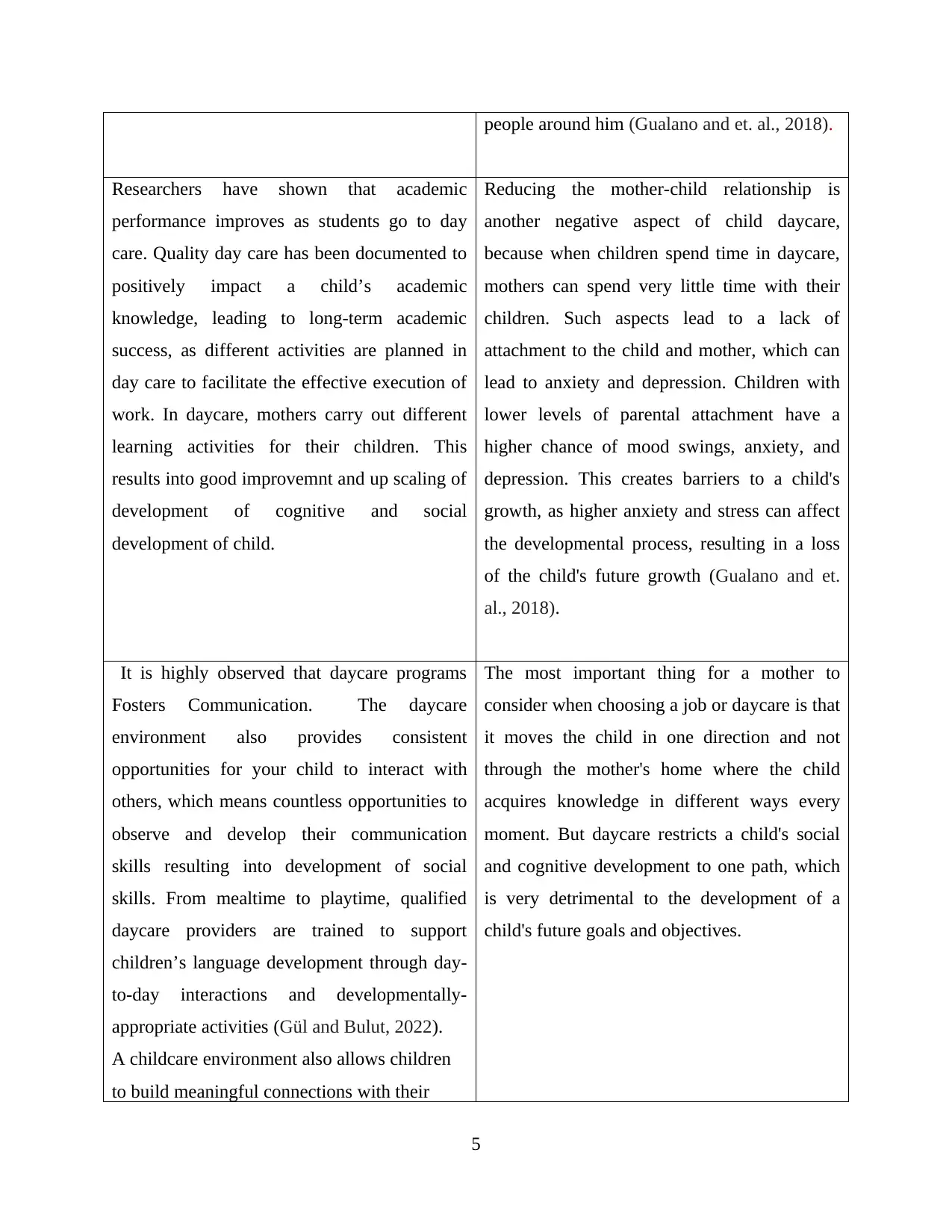
people around him (Gualano and et. al., 2018).
Researchers have shown that academic
performance improves as students go to day
care. Quality day care has been documented to
positively impact a child’s academic
knowledge, leading to long-term academic
success, as different activities are planned in
day care to facilitate the effective execution of
work. In daycare, mothers carry out different
learning activities for their children. This
results into good improvemnt and up scaling of
development of cognitive and social
development of child.
Reducing the mother-child relationship is
another negative aspect of child daycare,
because when children spend time in daycare,
mothers can spend very little time with their
children. Such aspects lead to a lack of
attachment to the child and mother, which can
lead to anxiety and depression. Children with
lower levels of parental attachment have a
higher chance of mood swings, anxiety, and
depression. This creates barriers to a child's
growth, as higher anxiety and stress can affect
the developmental process, resulting in a loss
of the child's future growth (Gualano and et.
al., 2018).
It is highly observed that daycare programs
Fosters Communication. The daycare
environment also provides consistent
opportunities for your child to interact with
others, which means countless opportunities to
observe and develop their communication
skills resulting into development of social
skills. From mealtime to playtime, qualified
daycare providers are trained to support
children’s language development through day-
to-day interactions and developmentally-
appropriate activities (Gül and Bulut, 2022).
A childcare environment also allows children
to build meaningful connections with their
The most important thing for a mother to
consider when choosing a job or daycare is that
it moves the child in one direction and not
through the mother's home where the child
acquires knowledge in different ways every
moment. But daycare restricts a child's social
and cognitive development to one path, which
is very detrimental to the development of a
child's future goals and objectives.
5
Researchers have shown that academic
performance improves as students go to day
care. Quality day care has been documented to
positively impact a child’s academic
knowledge, leading to long-term academic
success, as different activities are planned in
day care to facilitate the effective execution of
work. In daycare, mothers carry out different
learning activities for their children. This
results into good improvemnt and up scaling of
development of cognitive and social
development of child.
Reducing the mother-child relationship is
another negative aspect of child daycare,
because when children spend time in daycare,
mothers can spend very little time with their
children. Such aspects lead to a lack of
attachment to the child and mother, which can
lead to anxiety and depression. Children with
lower levels of parental attachment have a
higher chance of mood swings, anxiety, and
depression. This creates barriers to a child's
growth, as higher anxiety and stress can affect
the developmental process, resulting in a loss
of the child's future growth (Gualano and et.
al., 2018).
It is highly observed that daycare programs
Fosters Communication. The daycare
environment also provides consistent
opportunities for your child to interact with
others, which means countless opportunities to
observe and develop their communication
skills resulting into development of social
skills. From mealtime to playtime, qualified
daycare providers are trained to support
children’s language development through day-
to-day interactions and developmentally-
appropriate activities (Gül and Bulut, 2022).
A childcare environment also allows children
to build meaningful connections with their
The most important thing for a mother to
consider when choosing a job or daycare is that
it moves the child in one direction and not
through the mother's home where the child
acquires knowledge in different ways every
moment. But daycare restricts a child's social
and cognitive development to one path, which
is very detrimental to the development of a
child's future goals and objectives.
5
Paraphrase This Document
Need a fresh take? Get an instant paraphrase of this document with our AI Paraphraser
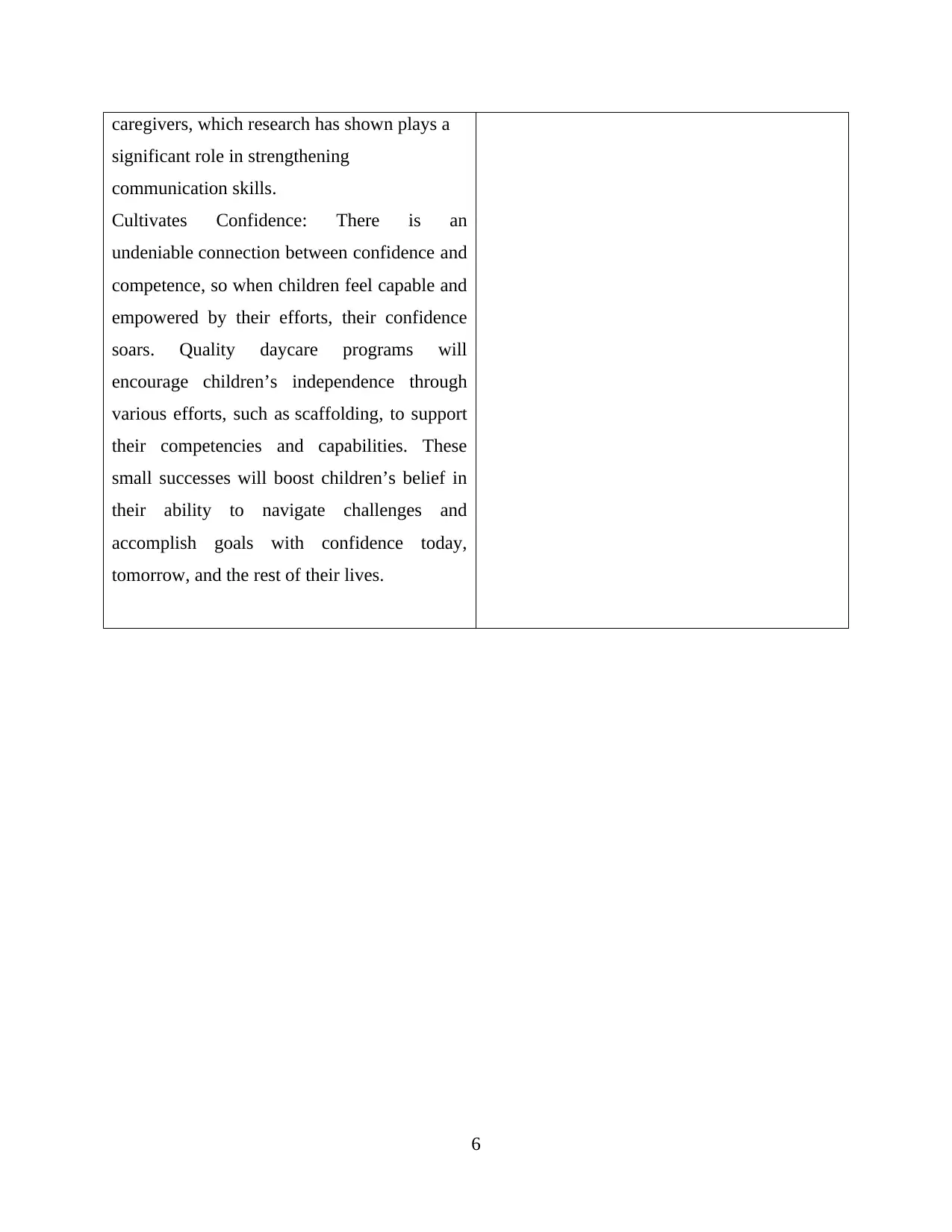
caregivers, which research has shown plays a
significant role in strengthening
communication skills.
Cultivates Confidence: There is an
undeniable connection between confidence and
competence, so when children feel capable and
empowered by their efforts, their confidence
soars. Quality daycare programs will
encourage children’s independence through
various efforts, such as scaffolding, to support
their competencies and capabilities. These
small successes will boost children’s belief in
their ability to navigate challenges and
accomplish goals with confidence today,
tomorrow, and the rest of their lives.
6
significant role in strengthening
communication skills.
Cultivates Confidence: There is an
undeniable connection between confidence and
competence, so when children feel capable and
empowered by their efforts, their confidence
soars. Quality daycare programs will
encourage children’s independence through
various efforts, such as scaffolding, to support
their competencies and capabilities. These
small successes will boost children’s belief in
their ability to navigate challenges and
accomplish goals with confidence today,
tomorrow, and the rest of their lives.
6
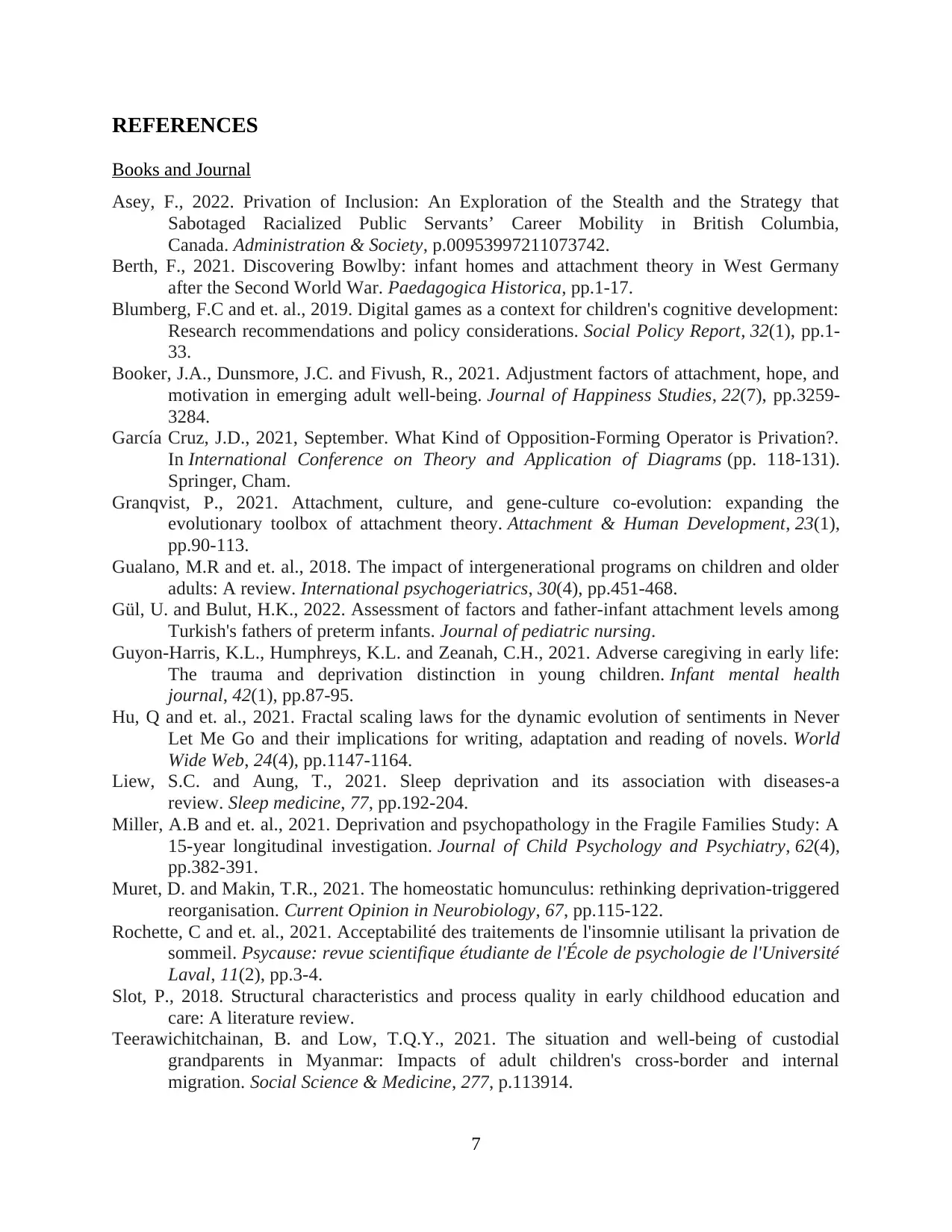
REFERENCES
Books and Journal
Asey, F., 2022. Privation of Inclusion: An Exploration of the Stealth and the Strategy that
Sabotaged Racialized Public Servants’ Career Mobility in British Columbia,
Canada. Administration & Society, p.00953997211073742.
Berth, F., 2021. Discovering Bowlby: infant homes and attachment theory in West Germany
after the Second World War. Paedagogica Historica, pp.1-17.
Blumberg, F.C and et. al., 2019. Digital games as a context for children's cognitive development:
Research recommendations and policy considerations. Social Policy Report, 32(1), pp.1-
33.
Booker, J.A., Dunsmore, J.C. and Fivush, R., 2021. Adjustment factors of attachment, hope, and
motivation in emerging adult well-being. Journal of Happiness Studies, 22(7), pp.3259-
3284.
García Cruz, J.D., 2021, September. What Kind of Opposition-Forming Operator is Privation?.
In International Conference on Theory and Application of Diagrams (pp. 118-131).
Springer, Cham.
Granqvist, P., 2021. Attachment, culture, and gene-culture co-evolution: expanding the
evolutionary toolbox of attachment theory. Attachment & Human Development, 23(1),
pp.90-113.
Gualano, M.R and et. al., 2018. The impact of intergenerational programs on children and older
adults: A review. International psychogeriatrics, 30(4), pp.451-468.
Gül, U. and Bulut, H.K., 2022. Assessment of factors and father-infant attachment levels among
Turkish's fathers of preterm infants. Journal of pediatric nursing.
Guyon‐Harris, K.L., Humphreys, K.L. and Zeanah, C.H., 2021. Adverse caregiving in early life:
The trauma and deprivation distinction in young children. Infant mental health
journal, 42(1), pp.87-95.
Hu, Q and et. al., 2021. Fractal scaling laws for the dynamic evolution of sentiments in Never
Let Me Go and their implications for writing, adaptation and reading of novels. World
Wide Web, 24(4), pp.1147-1164.
Liew, S.C. and Aung, T., 2021. Sleep deprivation and its association with diseases-a
review. Sleep medicine, 77, pp.192-204.
Miller, A.B and et. al., 2021. Deprivation and psychopathology in the Fragile Families Study: A
15‐year longitudinal investigation. Journal of Child Psychology and Psychiatry, 62(4),
pp.382-391.
Muret, D. and Makin, T.R., 2021. The homeostatic homunculus: rethinking deprivation-triggered
reorganisation. Current Opinion in Neurobiology, 67, pp.115-122.
Rochette, C and et. al., 2021. Acceptabilité des traitements de l'insomnie utilisant la privation de
sommeil. Psycause: revue scientifique étudiante de l'École de psychologie de l'Université
Laval, 11(2), pp.3-4.
Slot, P., 2018. Structural characteristics and process quality in early childhood education and
care: A literature review.
Teerawichitchainan, B. and Low, T.Q.Y., 2021. The situation and well-being of custodial
grandparents in Myanmar: Impacts of adult children's cross-border and internal
migration. Social Science & Medicine, 277, p.113914.
7
Books and Journal
Asey, F., 2022. Privation of Inclusion: An Exploration of the Stealth and the Strategy that
Sabotaged Racialized Public Servants’ Career Mobility in British Columbia,
Canada. Administration & Society, p.00953997211073742.
Berth, F., 2021. Discovering Bowlby: infant homes and attachment theory in West Germany
after the Second World War. Paedagogica Historica, pp.1-17.
Blumberg, F.C and et. al., 2019. Digital games as a context for children's cognitive development:
Research recommendations and policy considerations. Social Policy Report, 32(1), pp.1-
33.
Booker, J.A., Dunsmore, J.C. and Fivush, R., 2021. Adjustment factors of attachment, hope, and
motivation in emerging adult well-being. Journal of Happiness Studies, 22(7), pp.3259-
3284.
García Cruz, J.D., 2021, September. What Kind of Opposition-Forming Operator is Privation?.
In International Conference on Theory and Application of Diagrams (pp. 118-131).
Springer, Cham.
Granqvist, P., 2021. Attachment, culture, and gene-culture co-evolution: expanding the
evolutionary toolbox of attachment theory. Attachment & Human Development, 23(1),
pp.90-113.
Gualano, M.R and et. al., 2018. The impact of intergenerational programs on children and older
adults: A review. International psychogeriatrics, 30(4), pp.451-468.
Gül, U. and Bulut, H.K., 2022. Assessment of factors and father-infant attachment levels among
Turkish's fathers of preterm infants. Journal of pediatric nursing.
Guyon‐Harris, K.L., Humphreys, K.L. and Zeanah, C.H., 2021. Adverse caregiving in early life:
The trauma and deprivation distinction in young children. Infant mental health
journal, 42(1), pp.87-95.
Hu, Q and et. al., 2021. Fractal scaling laws for the dynamic evolution of sentiments in Never
Let Me Go and their implications for writing, adaptation and reading of novels. World
Wide Web, 24(4), pp.1147-1164.
Liew, S.C. and Aung, T., 2021. Sleep deprivation and its association with diseases-a
review. Sleep medicine, 77, pp.192-204.
Miller, A.B and et. al., 2021. Deprivation and psychopathology in the Fragile Families Study: A
15‐year longitudinal investigation. Journal of Child Psychology and Psychiatry, 62(4),
pp.382-391.
Muret, D. and Makin, T.R., 2021. The homeostatic homunculus: rethinking deprivation-triggered
reorganisation. Current Opinion in Neurobiology, 67, pp.115-122.
Rochette, C and et. al., 2021. Acceptabilité des traitements de l'insomnie utilisant la privation de
sommeil. Psycause: revue scientifique étudiante de l'École de psychologie de l'Université
Laval, 11(2), pp.3-4.
Slot, P., 2018. Structural characteristics and process quality in early childhood education and
care: A literature review.
Teerawichitchainan, B. and Low, T.Q.Y., 2021. The situation and well-being of custodial
grandparents in Myanmar: Impacts of adult children's cross-border and internal
migration. Social Science & Medicine, 277, p.113914.
7
⊘ This is a preview!⊘
Do you want full access?
Subscribe today to unlock all pages.

Trusted by 1+ million students worldwide
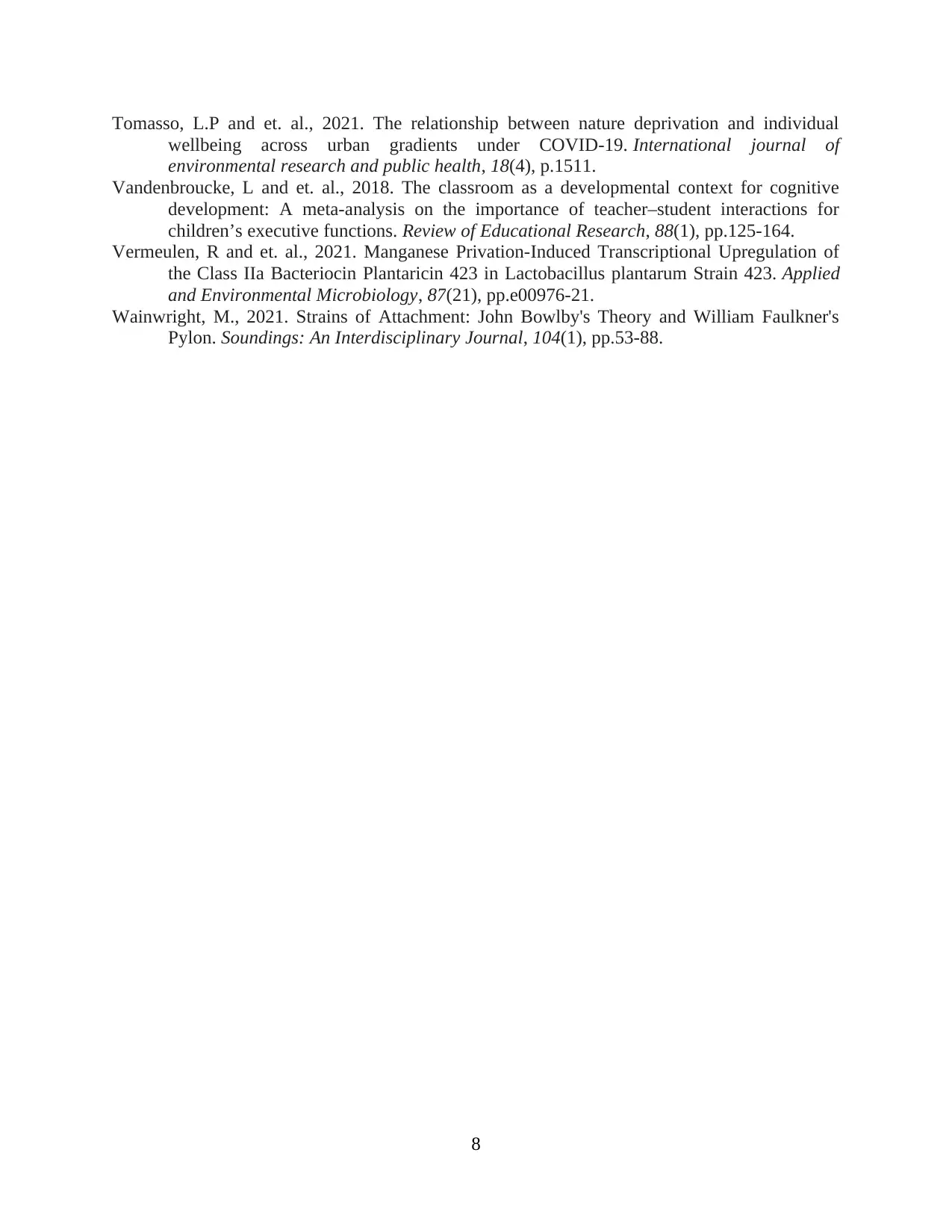
Tomasso, L.P and et. al., 2021. The relationship between nature deprivation and individual
wellbeing across urban gradients under COVID-19. International journal of
environmental research and public health, 18(4), p.1511.
Vandenbroucke, L and et. al., 2018. The classroom as a developmental context for cognitive
development: A meta-analysis on the importance of teacher–student interactions for
children’s executive functions. Review of Educational Research, 88(1), pp.125-164.
Vermeulen, R and et. al., 2021. Manganese Privation-Induced Transcriptional Upregulation of
the Class IIa Bacteriocin Plantaricin 423 in Lactobacillus plantarum Strain 423. Applied
and Environmental Microbiology, 87(21), pp.e00976-21.
Wainwright, M., 2021. Strains of Attachment: John Bowlby's Theory and William Faulkner's
Pylon. Soundings: An Interdisciplinary Journal, 104(1), pp.53-88.
8
wellbeing across urban gradients under COVID-19. International journal of
environmental research and public health, 18(4), p.1511.
Vandenbroucke, L and et. al., 2018. The classroom as a developmental context for cognitive
development: A meta-analysis on the importance of teacher–student interactions for
children’s executive functions. Review of Educational Research, 88(1), pp.125-164.
Vermeulen, R and et. al., 2021. Manganese Privation-Induced Transcriptional Upregulation of
the Class IIa Bacteriocin Plantaricin 423 in Lactobacillus plantarum Strain 423. Applied
and Environmental Microbiology, 87(21), pp.e00976-21.
Wainwright, M., 2021. Strains of Attachment: John Bowlby's Theory and William Faulkner's
Pylon. Soundings: An Interdisciplinary Journal, 104(1), pp.53-88.
8
1 out of 10
Related Documents
Your All-in-One AI-Powered Toolkit for Academic Success.
+13062052269
info@desklib.com
Available 24*7 on WhatsApp / Email
![[object Object]](/_next/static/media/star-bottom.7253800d.svg)
Unlock your academic potential
Copyright © 2020–2026 A2Z Services. All Rights Reserved. Developed and managed by ZUCOL.




